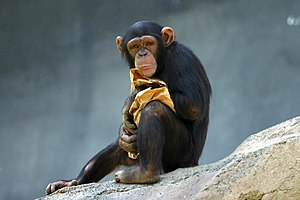
Researchers have uncovered evidence that monkeys and apes have a primitive sense of morality, namely, they can "make judgments about fairness, offer altruistic help and empathise when a fellow animal is ill or in difficulties. They even appear to have consciences and the ability to remember obligations."
This is similar to the research performed on dogs recently that uncovered the same results. When certain species have been trained to expect a reward for a particular action, they become less likely to perform the action when the reward is not offered or if another member receives a better reward.
The conclusion suggests that morality evolves from species with a strong social network, like dogs and primates (humans included), rather than a supernatural source. That is, unless God is deeply concerned about the behavior of gibbons and terriers and is trying to mold them to become children of God like he is reportedly doing with humans.
Furthermore, research like this closes the wide gap that some people have put in place between humans and other animals. Some people are offended by the idea that we are naked apes, or that apes are our close cousins. For one thing, it undercuts the notion of a literal Genesis reading that we are specially made by God for a particular purpose and destiny. It also is contrary to the command that humans are to have dominion over all other species--which is often interpreted to mean that we can exploit animals with no concern for their welfare. But if apes are our primate cousins, then it is just as immoral to exploit them as it would be to exploit our human cousins.

As the article explains, the notion that apes can tell right from wrong dates back to Charles Darwin, who suggested that when sexual reproduction forces animals to develop codes of behavior. Others have suggested that climate change or population pressure forces early humans to migrate to hostile, unknown areas, forcing them to enter into cooperative agreements when hunting or sharing food. Obviously if an alpha male violates the agreement by hoarding food for himself, then the entire community can suffer, which would lead them to enforce standards of behavior that all must follow for everyone's benefit.
I disagree with the article's conclusion:
Other studies have confirmed that the strength of a person's conscience depends partly on their genes. Several researchers have shown, for example, that the children of habitual criminals will often become criminals too - even when they have had no contact with their biological parents.
In my view, criminal behavior is too prone to influence from environmental factors to make this sort of suggestion.



No comments:
Post a Comment